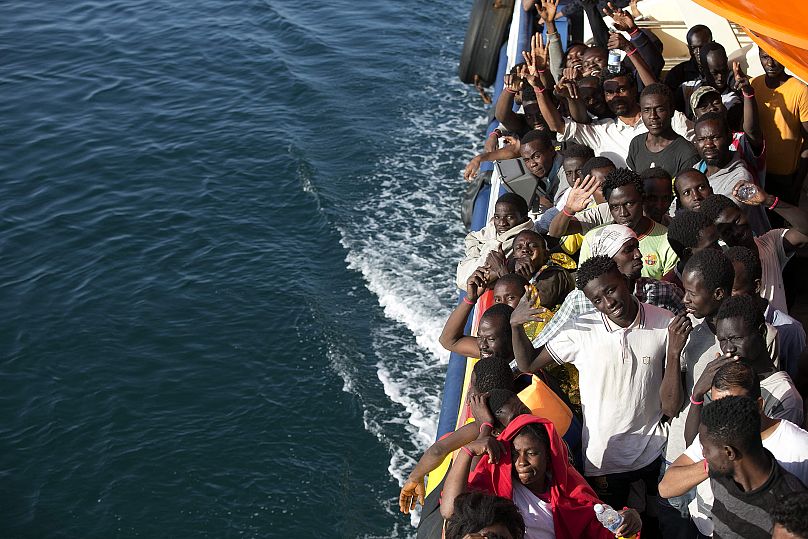Five years after the Iuventa search and rescue ship was seized by Italian authorities, the trial of 21 crew and NGOs members has not yet started as the Trapani court cannot provide qualified interpreters.
Italy's trial of migrant rescue NGOs involved in saving thousands of people from drowning between 2016 and 2017 is still struggling to make a start on, five years after it was initiated.
 ADVERTISEMENT
ADVERTISEMENT
 ADVERTISEMENT
ADVERTISEMENT
Twenty-one people – including the crews of the Iuventa search and rescue ship and members of several NGOs including Sea Watch, Save the Children and Médecins sans Frontières – stand accused of having colluded with human traffickers to allow for the unauthorised entry of migrants into Italy between 2016 and 2017, in what is the country's biggest trial against sea-rescue charities.
One of these 21 people is Dariush Beigui, who in the summer of 2016 was on board the Iuventa as a member of the German NGO Jugend Rettet. In that summer alone, the ship is estimated to have saved 2,000 people from drowning in the Mediterranean, according to the NGO.
Until the ship was seized in 2017, the Iuventa crew helped save the lives of 14,000 people, according to Amnesty International.
A total of 181,436 migrants landed in Italy in 2016, and 119,310 in 2017, according to Italian authorities.
Beigui, like his colleagues, stands accused of "aiding and abetting unauthorised entry into Italy" and could face up to 20 years in prison and a fine of up to €15,000 per person that was rescued if found guilty.
He has always rejected the accusations, as did his colleagues and the other NGOs involved, saying that their intervention was necessary to save human lives in danger. Under international maritime law, a vessel is obliged to aid people in peril at sea. But the Sicilian prosecutors say the refugees and migrants rescued by the Iuventa were not in "imminent danger."
Beigui is having a few issues getting questioned by the Italian court in Trapani, Sicily, where his case is being tried, and defending himself. That’s because the court has repeatedly failed to provide him with a proper interpreter: Beigui, whose mother tongue is German, doesn't speak a word of Italian; the city's police and the public prosecutor's office don't speak a word of German, and they’re struggling to find someone who does, at least on a court reporting level.
Beigui's lawyer Nicola Canestrini, a native German speaker from Italy's Trentino-Alto Adige, confirmed to Euronews that his client has not been able to be questioned by the court as this failed to provide a competent interpreter.
"You have no idea what's going on down there in Trapani," he said. "The first time we went to Trapani for questioning, they got us a tourist guide who spoke German. After four hours of questioning, the guide said they couldn't properly translate everything that was being said."
This happened the first time Beigui was called for questioning on 29 October, Canestrini said. The second time, on 12 November, something similar happened, said Canestrini, as Beigui was assigned an unqualified interpreter that couldn't accurately translate what was being said by his client in court.
On Friday last week, Beigui travelled to Trapani for the third time in a month. Once again, an attempt was made at questioning the defendant with the help of an interpreter – a retired police officer with German language skills.
"Things started going wrong immediately," said Canestrini. "The interpreter refused to translate everything, there were parts he wanted to cut out, even as I objected. A public official must write down everything, even if I speak nonsense – it cannot interpret what I'm saying."
After thirty minutes the interrogation was interrupted and, for the first time in 25 years working as a criminal trial attorney, Canestrini refused to sign the court report, he said.
The Iuventa crew has launched a campaign on Twitter addressing the issue called #NoTranslationNoJustice, saying: "This is yet another facet of EU’s lawfare against people on the move and another wall of Fortress Europe against which people are supposed to fail.
"We call on those - who support the people in spite of these conditions, whose work is poorly paid and thus devalued, who struggle daily against the hurdles of state ignorance and calculating arbitrariness- to share your experiences, anger and rage, to make them visible!"
It's possible that the reason why the Sicilian court is failing to get a hold of a qualified interpreter is likely that these are rare in Italy, where they are paid much less than in the rest of Europe. A 2017 report found that in Italy court interpreters and translators were paid less than €4 per hour.
Beigui has called the situation "ridiculous," while Canestrini described the trial as a "farce."











